sfk.info has been around for over half a year now (as of July 2020) and I have to say that I am amazed by the amount of attention the website has already received. When I started out, I expected maybe to get a few hundred clicks the first year, but the site averages about 2,000 new visitors every month! 🤩
But at the end of the day, the blog is really just window dressing. The interactive part happens here, in the Facebook group Scottish Fold Info Community. I also receive a couple of mails a day, asking me for advice about breeders or regarding Foldies who are showing symptoms of OCD. So although I’m excited about all the interest and people wanting to get information about the breed, it has reached a point where I hope to bundle the Foldie Frequently Asked Questions in one place – here in this “Foldie FAQ.”
- What is “Scottish Fold OCD”?
- Is there a cure for Scottish Fold OCD?
- How do I know if my Fold has OCD?
- My Fold has a stiff tail or has started limping – what do I do?
- Is there anything I can do to prevent OCD?
- I already have a Fold. Can I do anything to protect their joints? (spoiler alert: YES!)
- Can you recommend a breeder in ABC? / Is Breeder XYZ good?
- Do I really need pedigree papers? But I’m only looking for a pet!
- What causes OCD?
- Should I get a gene test for my Fold?
- Should I get a rescued Scottish Fold – won’t they develop OCD?
- I have a Scottish Straight. Should I be worried about OCD?
- What should I feed my Foldie?
- One Foldie or two?
- There are so many cats in shelters. Isn’t it wrong to breed cats at all?
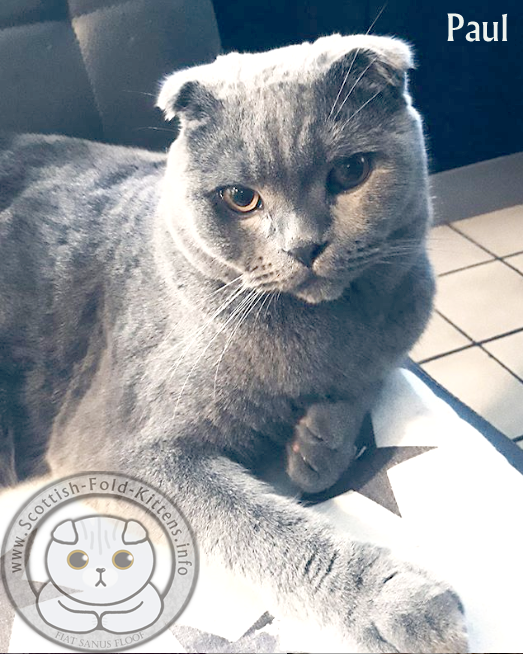
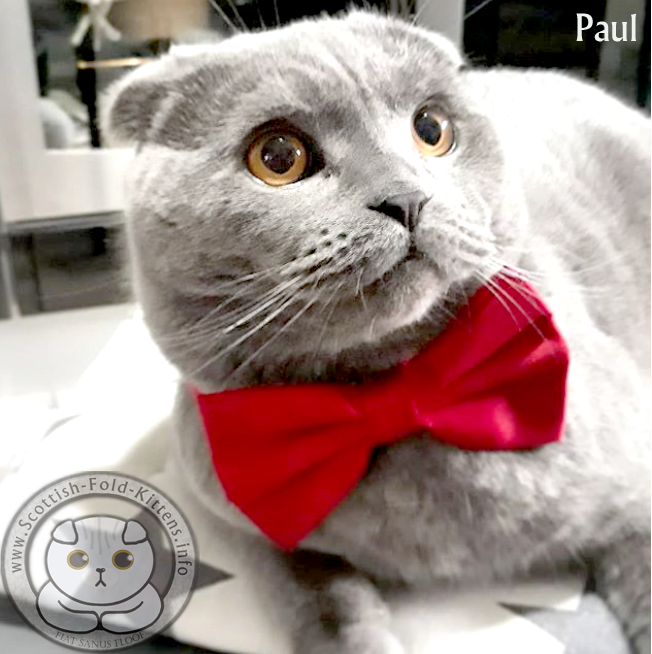

Photos of Paul appear courtesy of Tica’s Catz
1. What is this “OCD” I keep hearing about?
When we’re talking about Scottish Folds, OCD doesn’t refer to Obsessive-Compulsive Disorder, like when we’re talking about people. It’s short for osteochondrodysplasia, which literally means the abnormal development of the bones and cartilage. Read more about Scottish Fold OCD
2. Is there a cure for Scottish Fold OCD?
No, there is no cure for OCD, but it can – and should! – be treated. There is no reason why a cat should have to suffer in silence. I have collected all the treatments I could find for this condition in one place. Please see the article My Scottish Fold has OCD – What can I do?
3. How do I know if my Fold has OCD?
The typical signs of malevolent OCD are a shortened, stiff tail, limping, a reluctance to jump (up and/or down), doesn’t like to be touched (tail, back, paws), has visible deformities or growths around their paws, reluctance to move or play – even to get up to go to their food dish or litter box. Read more about how to tell if your Fold has OCD
4. My Fold has a stiff tail or has started limping – what do I do?
If you have a Scottish Fold and are noticing signs of osteochondrodysplasia, or “OCD” for short, you should take them to a vet who is familiar with Scottish Fold OCD for diagnosis and treatment. Read more about how to tell if your Fold has OCD
5. Is there anything I can do to prevent OCD?
“An ounce of prevention is worth a pound of cure,” as the saying goes. The main purpose of this blog is to educate buyers so that they are aware of the risks and get their Folds from responsible breeders, which are then less likely to develop malevolent OCD, as this poll shows.
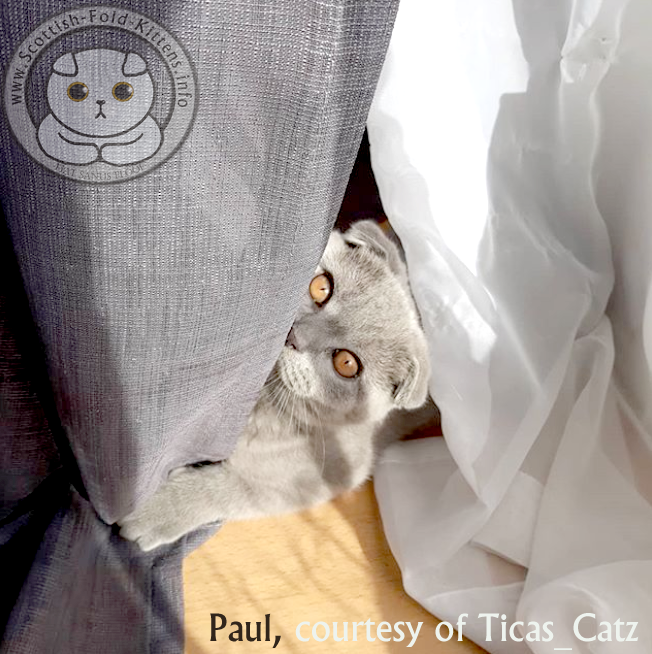
6. I already have a Fold. How can I protect their joints?
I recommend giving any Fold glucosamine/chondroitin supplements – even if they are not currently showing signs of discomfort or OCD. This is because there are no known side effects of these “nutraceuticals,” but benefits are often reported. A recommended prophylactic dosage would be 125 mg of glucosamine per day for a 10 lb. cat. If a cat this size is showing symptoms of OCD, you would want to give this amount twice daily.
7. Can you recommend a breeder in ABC? / Is Breeder XYZ good?
I am often asked about breeders via private message and always have to answer the same thing: I am not a cattery inspector, so I can’t say whether or not a particular breeder has done everything they could in order to bring healthy animals into the world. BUT I do have things I look for which give me a good indication. Here’s a step by step guide on how to recognize a good breeder
8. Do I really need pedigree papers? But I’m only looking for a pet!
You have gone to a lot of trouble to find a good breeder and you are paying somewhere around $1,500 – $2,000 for your new furry family member, so those pedigree papers are rightfully yours. They belong to your kitten, like your last name belongs to you. These papers show the previous 3-5 generations of your cat’s lineage. And, like this, you are able to make sure that there wasn’t any Fold to Fold mating going on – which means your cat is less likely to have health issues, as demonstrated in the poll.
Read more about why you should insist on getting pedigree papers for your kitten
9. What causes OCD?
Scottish Fold osteochondrodysplasia or SF OCD is caused by a mutation of the TRPV4 gene (a.k.a. “the Fold Gene”), as discovered by Barbara Gandolfi together with a team of researchers in 2016 and reported in this paper. A kitten inherits two genes from their parents and only one of them has to be a Fold gene in order for their ears to fold. If a cat has two folded ear parents, they could end up with two Fold genes and it is virtually guaranteed that they will suffer from severe OCD for their entire life. This is why folded ear cats should always be mated to straight eared cats – otherwise the person is engaging in animal cruelty. Read more about the genetics of Scottish Folds
10. Should I get a gene test for my Fold?
The short answer is: If you’re a pet owner, then no. And if you’re a breeder, then yes – and especially for your Straights. Keep reading if you would like to find out why
11. Should I get a rescued Scottish Fold – won’t they develop OCD?
It’s true that a rescue Foldie is less likely to have a pedigree – and, yes, this also means they are more likely to develop OCD. BUT since most rescues are no longer kittens, you will have a better idea of what to expect healthwise before making this commitment. If it’s a severe case of OCD, it should be pretty obvious by the time a cat is 18 months old. So, if you have the funds to treat a Foldie in case they get sick, rescuing is a very rewarding experience and we owe it to them as well. But if you cannot afford to take care of a pet who’s chronically ill, then I would not recommend getting a Scottish Fold at all, since there is always a risk.
12. I have a Scottish Straight. Should I be worried about OCD?
No. Scottish Fold osteochondrodysplasia or SF OCD is caused by the gene mutation which also causes the folded ears. If your cat is a true straight – meaning both of the TRPV4 alleles are fd-fd – then there is absolutely no risk of SF OCD. It does not mean your Straight can’t have arthritis or other joint issues such as hip dysplasia, but by definition SF OCD is caused by the Fold gene (Fd), which your cat does not have. Read more about the genetics of Scottish Folds
13. What should I feed my Foldie?
Foldies are so cute. But even though they look like cuddly toys, don’t forget that they are in fact carnivores and need to eat meat to survive. So the best thing you can give your goofy darling is wet food packed with protein and animal fat and low on fillers such as grains, vegetables or any form of carbohydrate. And of course: NO SUGAR!!! The absolutely brilliant and highly respected “cat whisperer” Pamela Merritt, author of the blog The Way of Cats, refers to their nutritional needs as “Catkins.” The veterinarian Lisa A. Pierson has devoted an entire website at catinfo.org to explaining the dangers of feeding our cats dry food, a convenience product which can lead to all sorts of health problems, since they have a low thirst drive to begin with and need to get moisture from their food (meat and canned food are 80% water; dry food only about 5%). Read more about feline nutrition
14. One Foldie or two?
Only cats are made not born. A lot of people think they can only handle one cat. But in reality, two cats who grow up together – ideally even siblings – are much easier to keep happy. Cats communicate mainly through body language. It’s completely different than how we talk to them or how a dog interacts with them or any other species. Just imagine that you were sent to live with a herd of elephants. They might be very nice to you and feed you and cuddle with you, but you would miss having someone to talk to. And that’s how it is for cats: They love us, but they also love playing and sleeping with and grooming other cats. Not all cats get along and they need to be introduced slowly. But even feral cats choose to live in colonies. They may be solitary hunters, but they are very social creatures and in most cases they enjoy feline companionship. It’s just important to match them up as closely as possible regarding their personalities and energy levels. For this reason, it’s better to get two Foldies than one Foldie and one Bengal, for example.
15. There are so many cats in shelters. Isn’t it wrong to breed cats at all?
I think we can agree: Purebred cats aren’t for everybody. There is still quite a large percentage of the cat appreciators out there who believe kittens should be given away for free and balk at the thought of spending hundreds let alone thousands of dollars on a pedigreed cat. I personally think this is detrimental to how cats are perceived in general, that some people don’t see them as having value, which makes them more or less disposable. And I think we need to work at limiting their numbers and increasing the perception that they are, in fact, worth a lot. My plan is pretty radical, but it just might work. Read more
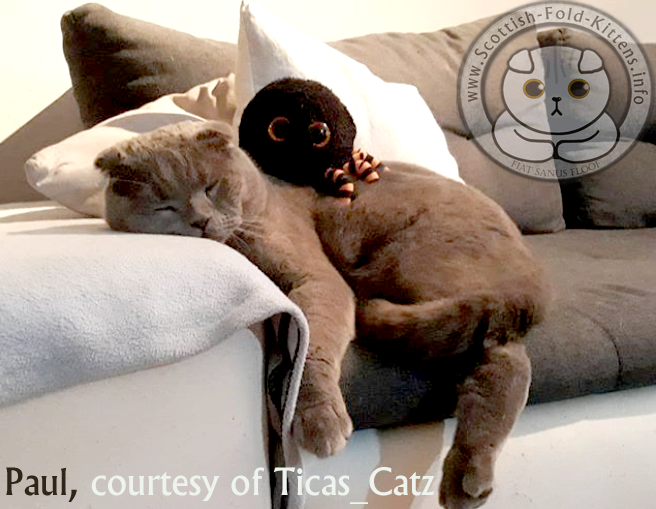
Read More
Read More about Scottish Fold OCD
All Scottish Folds – meaning all cats with folded ears – have OCD to at least some degree. This is because it’s what makes their ears fold in the first place. The kittens are born with normal ears and the cartilage holding them up weakens and eventually gives out at around 3 – 4 weeks of age due to osteochondrodysplasia or “OCD,” causing the ears to fold.
But we don’t say that all Scottish Folds suffer from OCD, even though they all have it in their ears at least. But Fold enthusiasts consider a cat to be healthy if the OCD only affects their ears – as breeders and owners hope it will. If, however, signs of OCD show up in other parts of a Scottish Fold’s body, this is an unwanted condition and painful to the cat. It is necessary to find a veterinarian who is familiar with this illness and get treatment in order to improve your cat’s quality of life.
Please keep in mind that this is a progressive condition. So even if a Scottish Fold has been x-rayed and was free of OCD at that time, this doesn’t mean they won’t develop it later on.
Read more about how to tell if your Fold has OCD
Of course we don’t only mean your cat’s folded ears in this case (which are also a result of OCD), but rather that it is showing up in other places in your cat’s body, where it shouldn’t, which causes painful, arthritis like symptoms.
But even if your Scottish Fold suddenly starts limping, for example, you shouldn’t jump to the conclusion that they have OCD without consulting a veterinary professional first. This is because even Folds sometimes just overexert themselves or tear a ligament while playing and you wouldn’t want this to go untreated.
A vet familiar with Scottish Fold OCD will need to x-ray your cat in order to make a definitive diagnosis. Or sometimes if it is obvious but you just want to find out if your cat is in pain, they may choose to prescribe pain medication for a short period, such as 3 – 5 days, to see if your cat acts differently. If your Foldie suddenly becomes more active, then this would be a sign that they were in pain and will need continued treatment. Painkillers are only one of several approaches to the long-term management of OCD – please see the article My Scottish Fold has OCD – What can I do? for additional and alternative treatments.
Read more about why you should insist on getting pedigree papers for your kitten
I chat with a lot of breeders. And they often tell me, “But the buyers don’t care if they get pedigree papers or not. They’re just looking for a pet.” And I know that it’s true. But you should care.
For the health of your own pet, as explained above. And, just as important, they prevent backyard breeding. Breeders who don’t give pedigrees or charge extra for them aren’t registering all of their litters. And that’s not a good sign. It means they might be overbreeding their females – nobody knows. And maybe they aren’t keeping track of which cats they mated with which, and are practicing inbreeding – or Fold to Fold breeding, which is practically a guarantee for OCD.
And once you realize that there are almost no regulations in place protecting the animals being bred or the customers buying the kittens, you will start to understand why you need to take every precaution you can get. Read about the kitten Ronin to find out about all the things that can go wrong, even with a breeder in an association. 😿
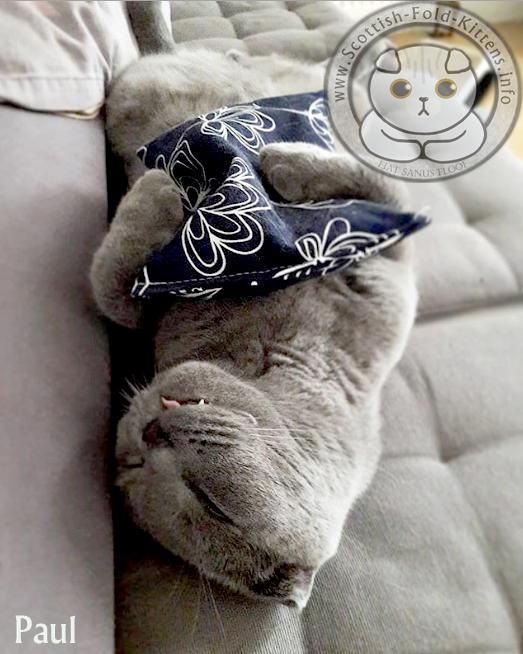
Read more about the genetics of Scottish Folds
When more than one variation of a gene can occupy the same position or locus on a chromosome, the variations of this gene are referred to as alleles. There are only two known possibilities for the alleles a cat can have at this particular locus on the chromosome: either Fd i.e., the mutant “Fold Gene” which results in folded ears or fd, the regular or “wild-type” variation of this gene, which is found in all cats with straight ears.
The Fd gene is a highly penetrant autosomal dominant trait (view source). This means that even if a cat only has one of these alleles, it will express the phenotype (= folded ears). The Fd gene dominates the fd gene and does it on its own or is autosomal, meaning that it only takes one to express the trait.
A responsible breeder mates a heterozygous folded ear cat (Fd-fd) with a straight eared cat which a gene test has shown to be fd-fd. Heterozygous means that the genes are mixed, as opposed to the same one twice – that’s called homozygous. The straight eared cat is usually a Scottish Straight, but cat associations also allow outcrosses to the breeds British Short Hair or American Short Hair. Any cat which doesn’t have folded ears has two regular TRPV4 genes: fd-fd.
When you breed two cats together, nature throws the dice:
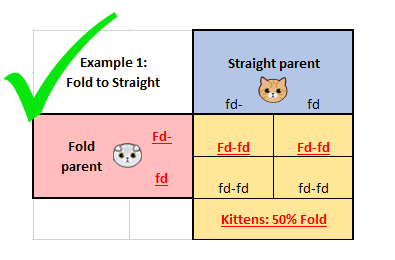
When a Fold is bred with a Straight, about half of the kittens (50%) will have folded ears (see Example 1. above). But this is only the long-term probability: A single litter could have all Folds, all Straights or anything in between.
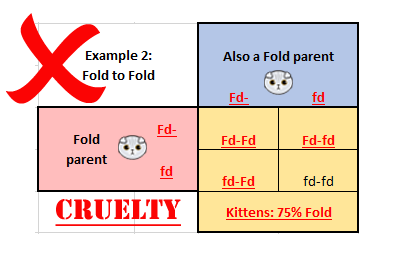
This is a form of animal cruelty and should never happen.
Contrary to popular belief, breeding 2 heterozygous Folds (which is never a good thing to do!) does not mean all of the kittens will be Folds. The probability is that 75% of the kittens will have folded ears. But, again, a single litter can have any combination. So just because there are Straights in a litter does not prove that both parents were not Folds.
It can’t be stressed enough: A breeder has to be very careful not to allow two Folds to mate, due to the health repercussions. The easiest way is if they only keep folded ear cats of one sex and straight eared cats of the other. This avoids any “accidents” from happening.
Read more about the Gene Tests available for Scottish Folds and Straights
Pet Owners and the Gene Test
Some vets recommend a gene test for a Fold as an indicator of how likely they are to develop OCD. In this case, you can find out if the cat in question has one or two Fold genes. If the cat has two, it is definitely the product of a Fold to Fold mating and much more likely to get severe OCD. BUT it is also possible that a cat only inherited one Fold gene even if both parents were Folds, as explained here. And there are many other indicators of OCD, as mentioned here. So, unless you’re involved in a lawsuit and trying to prove that a breeder mated two Folds, there isn’t usually a good reason for a pet owner to order the test.
Breeders and the Gene Test
There are two types of gene tests you can have done on your Scottish Fold or Straight cat: You can find out how many Fold genes your cat has (0, 1 or 2) and whether or not your cat has PKD1, which is short for polycystic kidney disease. PKD1 is hereditary and there is no cure. So the only way to prevent this fatal disease is through selective breeding: any carriers should be altered and eliminated from the breeding program.
So, while it may not be so important for pet owners (assuming your cat’s parents were tested), this test is extremely important for breeders. And it is also a good idea to have their Straight breeding cats tested for the Fold gene while they’re at it. Though rare, occasionally a genetic Fold’s ears straighten back up so that they are no longer creased. Since we know how dire the consequences are when two folds are mated, it’s better to take every precaution to prevent this from happening.
There are several companies offering testing kits online where you swab your cat’s cheek and send the swab back to their lab for results. But the cheapest option seems to be the lab at UC Davis, where the test only costs $40 for the Fold gene and $65 if you also test for PKD1. Link to UC Davis
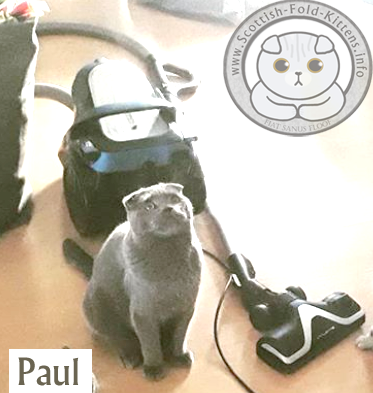
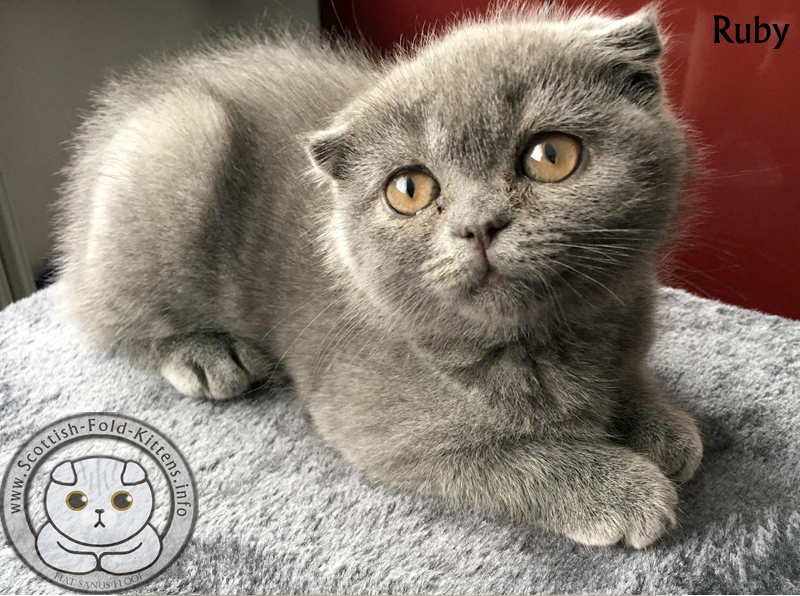
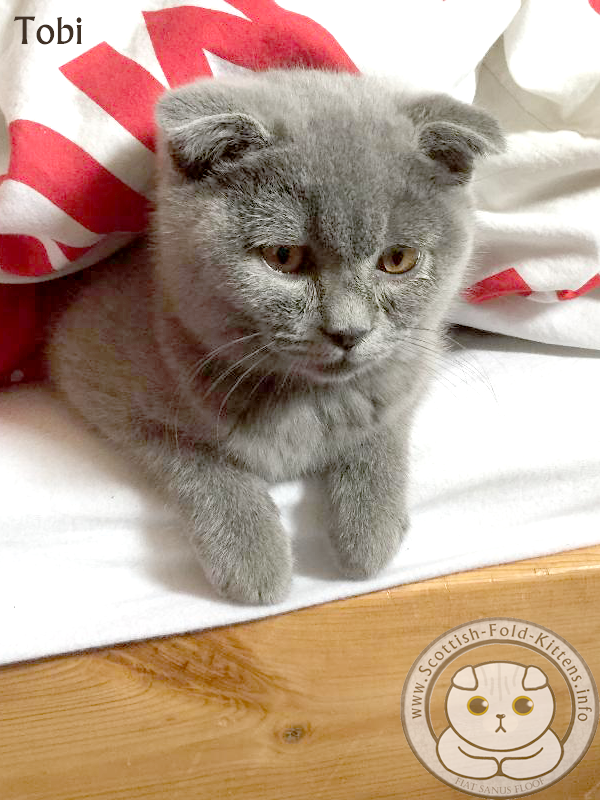

1 thought on “Foldie FAQ”
Comments are closed.